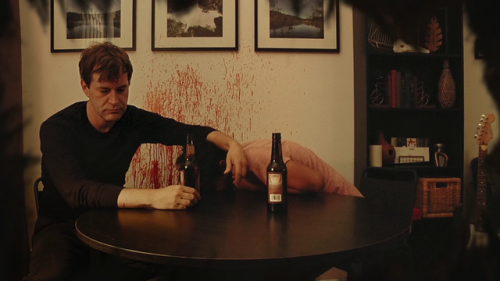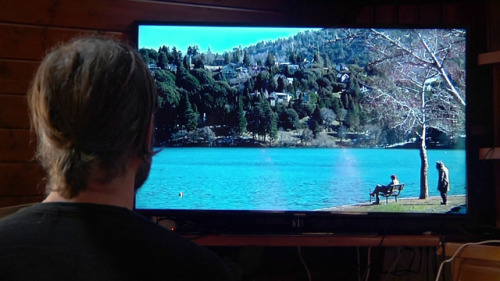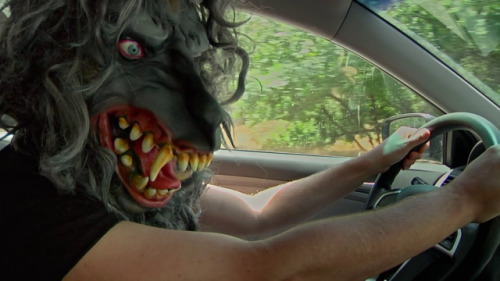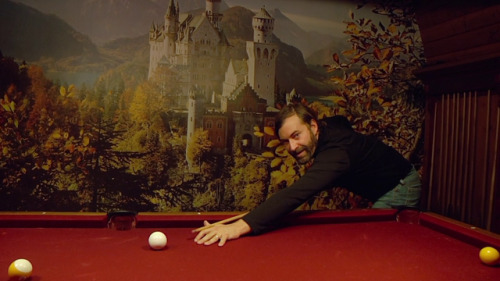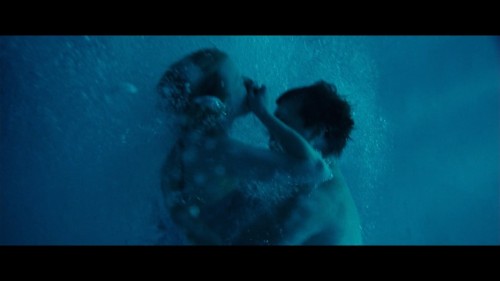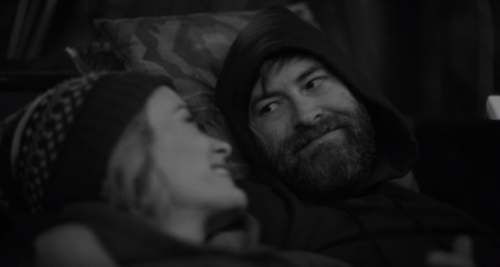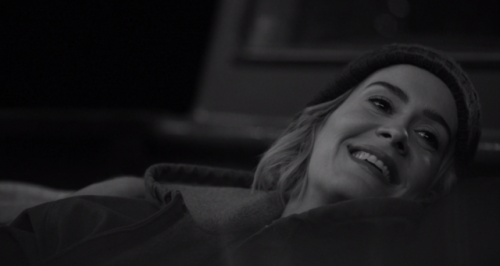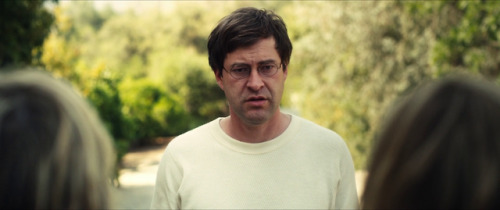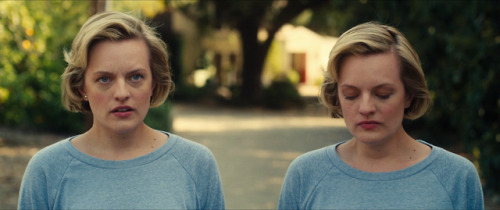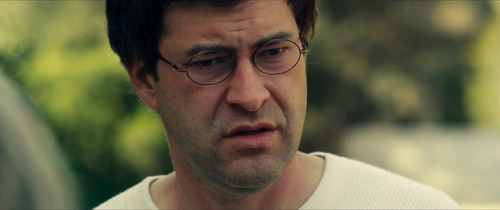#mark duplass

Treat others the way you want to be treated
Otherwise you’ll get your punishment
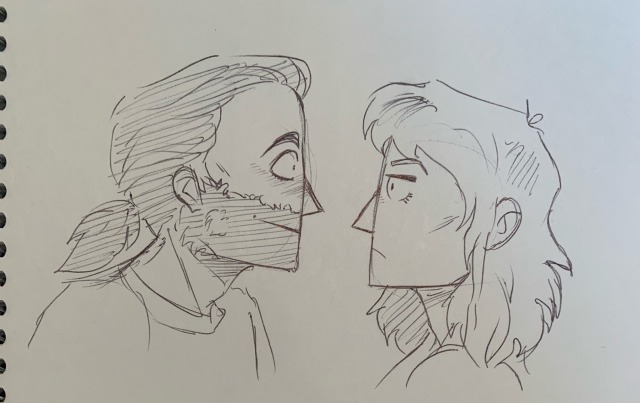

Creep 2 doodlies from memory
The Scrote Squad

“I can’t help but wonder about my fate”
Stoner comedies get a bad rap - and deservedly so. While the vast majority of these movies (Dude, Where’s My Car?, the Harold and Kumar series, etc.) play these drug-induced capers for cheap laughs (“duuuuuuuuuuuuuuuuuuuude”), Jeff, Who Lives At Home, the new film from Jay and Mark Duplass, takes a far more realistic approach to drug use, creating a surprisingly charming and affecting subversion of the stoner sub-genre.
Jeff, Who Lives At Home follows the titular Jeff, a thirty year old man-child living in the basement of his mother’s house, whose only real interests are smoking weed, and his favourite movie, M Night Shyamalan’s Signs. His love for this film dominates his view of the world - everything he sees is construed as a sign, and these signs, when he finally decides to follow them, lead him to a variety of personal triumphs, as well a mystery involving a man named Kevin.
The most impressive element of the film is the characterisation of Jeff. On paper, and in many lesser films, Jeff would be someone to laugh at - his brother’s initial reaction to Jeff’s personality could be construed as a comment on this - but here he’s more than that: he’s interesting, caring, and, most of all, he’s incredibly kind hearted.
It’s this kindness that lends Jeff, Who Lives At Home its charm. By creating such a complex, hippie-ish, and interesting central character in Jeff, the Duplass brothers have achieved the feat of creating a profoundly heartfelt (and quietly hilarious) movie about a jobless thirty year old man-child living in his mother’s basement smoking weed all day trying to find his destiny.
And that kind of thing doesn’t happen by accident.
I Have a Completely Rational Hatred for Mark Duplass
The fourth season of FX’s The League doesn’t premiere for a couple months yet, but that doesn’t mean its stars haven’t kept busy. Paul Scheer filmed a second season of Adult Swim’s NTSF:SD:SUV:: this spring. Nick Kroll is working on the Nick Show Kroll for Comedy Central. And Mark Duplass, the ostensible lead of The League, has no less than five movies coming out this summer, which is somewhat ridiculous.
I’ve always had problems with Duplass on The League. Considering the ensemble around him, he always felt like the odd man out. The show already has a much more relatable and sympathetic comic foil in Stephen Rannazzisi, yet Duplass’ acting style isn’t manic or bizarre enough to compete with Scheer, Kroll or Jon Lajoie. He has the demeanor of an everyman but works with material better suited for a more exaggerated character. In other words, he’s the one annoying aspect of an otherwise great show.
I’ve wondered if this was just a result of poor casting. Considering Mark Duplass is somewhat of an indie film darling, having served as a leading figure in the mumblecore movement, I thought it might just be that he didn’t really fit in with The League, which isn’t necessarily his fault. It could be a similar situation to that of former Parks and Recreation cast member Paul Schneider, the proto-normal guy who never really gelled with the rest of the ensemble (Adam Scott basically stepped into that same role when Schneider left the show and has proved a much better fit).
Until recently the only other work I had seen Duplass in was Lynn Shelton’s Humpday, a movie I thought was couldn’t quite handle its high concept plot, and I hadn’t seen any of his directorial efforts with his brother Jay Duplass. But this summer is making me feel that Duplass in general is just an overrated talent. His performance in Your Sister’s Sister, another Lynn Shelton movie, fell completely flat despite the fact that he was working with two actors in Emily Blunt and Rosemarie DeWitt who tonally should be a good match for him. Meanwhile, his work in the Aubrey Plaza-starring time travel comedy Safety Not Guaranteed runs into many of the same issues that hinder him in The League - he is given a character who is a bit extreme and out there, but Duplass just doesn’t seem capable of “out there” characters.
Conclusion:The League’s creators didn’t just screw up in casting Duplass. Duplass screwed up in being Duplass. If that makes any sense. Which it probably doesn’t.
Post link
The One I Love | 2014 | Charlie McDowell
RT: 80% IMDb: Struggling with a marriage on the brink of falling apart, a couple escapes for a weekend in pursuit of their better selves, only to discover an unusual dilemma that awaits them. Stars: Mark Duplass, Elisabeth Moss, Ted Danson
Post link
“This is something we’ve been talking about; creating a new relationship.”
The One I Love (2014) dop. Doug Emmett
dir. Charlie McDowell
Post link

It is painful when the one we love stops mirroring our best self, who we want to be, or most importantly who we are most comfortable being. bell hooks says about love, “We see movies in which people are represented as being in love who never talk with one another…Indeed, the message received from the mass media is that knowledge makes love less compelling; that it is ignorance that gives love its erotic and transgressive edge.” The One I Love at once supports and negates hooks’s assertion. Sophie, played by Elisabeth Moss, and Ethan, played by Mark Duplass, are at once more and less in love as their intimacy deepens and the film complicates itself, creating a Twilight Zone-like reality which makes for one of the more realistic yet bizarre portrayals of love and marriage I have ever seen.
Having somewhat recently gotten out of a decade long, on and off again relationship that seemed eerily similar to the one I knew to be portrayed in the film, I was more than ready for the catharsis I thought Charlie McDowell’s directorial debut might bring. The One I Love did not disappoint, nor did it fulfill my desire for a tidy, comforting ending, which I hoped would leave me feeling sanguine about the possibilities of romantic love and longing. If anything, this film left me with more questions, a strange verisimilitude creeping into the final moments of an otherwise implausible narrative.
The film begins with a flashback of how Sophie and Ethan met at a party and quickly found themselves sneaking into a neighbor’s backyard, breaking into their pool. “We were swimming and we were in love,” Ethan remembers fondly. Soon we see that Ethan, now several years older and married to Sophie who is sitting in the chair beside him, is recounting the moment they first fell in love to their therapist. He goes on to explain how he recently tried to recreate that moment with Sophie. We even see a flashback of his failed attempt at nostalgic romancing. “I felt like our happiness used to be so easy and there used to be so much of it and now I feel like happiness is something we have to recreate,” Sophie says. Soon after, the crux of Ethan and Sophie’s troubles, why we discover them in the therapist’s office to begin with, is revealed: he cheated, she found out, he wants to “move on,” and she can’t seem to. “Because you don’t get to decide that, Ethan. You don’t get to decide when we move on. I do.” Thus the power struggle that becomes the heart of the weird dream of this film commences.
Ethan and Sophie’s therapist recommends they go away for a long weekend to a place he’s successfully sent many other couples. The couple arrives in awe. The main house, guest house, and pool are beautiful. We begin to see what may have initially drawn these two together as they laugh over glasses of wine at dinner, get high together like teenagers, and tease each other playfully like new lovers often do. Still, there are hints of the underlying resentment Sophie seems unable to let go. She makes comments about Ethan’s glasses throughout the film, how she likes him better without them, and has he ever thought of not wearing them? It’s a seemingly innocuous comment that only the most emotionally inept would be unable to tell is meant, whether consciously or not, to wound Ethan’s ego, the same ego that so badly needed him to sleep with another woman in order to cope with the rough patch he and Sophie previously found themselves in. The specificity and power of this detail points to a larger strength of the film: that the characters consistently feel so damn real. Even Ethan and Sophie’s doppelgangers, who we soon meet, are trenchant though they mostly function as the bizarre twist of the narrative.

Sophie meets Ethan’s doppelganger the first night when she’s in the guest house alone. Markedly, a Matryoshka doll falls to the floor and when Sophie picks it up she turns to see Ethan Two who she believes to be her husband. The Matryoshka doll appears later in the film after Ethan and Sophie figure out that their doppelgangers do indeed exist when they are each alone in the guest house. Sophie takes apart the nesting doll while spending time with Ethan Two and in a poignant, albeit silly moment, she describes each doll from largest to smallest, the doll ostensibly representing the many selves competing for her attention, the selves trying to decide between staying with her husband or allowing herself to fall in love with his doppelganger, a sexier, more communicative, relaxed, and emotionally vulnerable version of the man Sophie used to feel so connected to.
Somewhat unfortunately for him, the funniest and saddest parts of this film are in response to Ethan’s extreme insecurity and jealousy of this other version of himself. It is understandable. We all have been envious of those who seem to more fully embrace the parts of themselves that we are most insecure about. How much more difficult would it be to compete with a slightly better version of yourself which, for whatever reason, you can’t seem to become? In addition, Ethan Two is not a man, insofar as the film reveals to us, who is deservedly ashamed of himself, his cowardice, and his insecurity as Ethan One most deservedly is. This dichotomy, the tension and empathy created between these struggling selves, is fascinating and like a nightmare come to life, taking cues from experimental films like Maya Deren’s Meshes of the Afternoon and Chris Marker’s La Jetée, but with a mumblecore influenced aesthetic.
The cinematography adds another layer, allowing lens flares to occur just often enough to accentuate the dreaminess of the film. The score is also simplistic and pulsative, effective in creating a feeling of unease, suspense, and vengeful gaiety as Sophie breaks the rules of the game, falls deeper and deeper for Ethan Two while Ethan One’s jealousy consumes him, causing him to further betray her and make things a lot more difficult for her terrifyingly domestic, two-faced doppelganger, who is extremely unhappy that Ethan Two is slipping from her grasp.
Ultimately, this film is a scorned lover’s revenge fantasy played out to the extreme. In all ways, the women win in the end, duping their betrayers and getting what’s theirs. Sophie takes her power back by leaving her adulterer husband for a version of himself that she describes as like a memory of him, a self she once loved deeply, a self with whom she did not need to recreate happiness, but rather just was happy. Sophie’s dilemma could be summed up as Emily Dickinson so pithily bemoaned: “Heart, we will forget him! / You and I to-night! / You may forget the warmth he gave, / I will forget the light. / When you have done, pray tell me, / That I my thoughts may dim; / Haste! lest while you’re lagging, / I may remember him!” Sophie not only gets to leave and betray the Ethan that betrayed her, but she also gets to preserve and relive the memory of the man she once fell in love with through her relationship with Ethan Two. At least that’s what’s strongly implied in the final scene, and how I read the many vagaries leading to it.

Although the denouement of The One I Love doesn’t quite provide an answer to the central thesis of the film, it does give us some sort of resolution by asking the question again. How much can we ever really know the one we love? Is it possible to know more than the character any of us create for ourselves, particularly in the throes of romantic love or the often terrifying intimacy of marriage? I’m no closer to an answer to these questions. Truthfully, this film left me devastated and frustrated by its unwillingness to soothe with romantic comedy-esque notions of dumbfound love and commitment. The One I Love is outlandish, funny, astute in its particulars, and honest about the intricacies of attraction, admiration, resentment, and often the dishonesty with self and others that comes with what we call loving. In the end, more than anything, it is truthful about how amazingly complicated loving someone is, or at the very least, can be.
Review by Rachel Ann Brickner.
FOLLOW ME ON TIKTOK TO SEE ME SIMP FOR SLASHERS. IF YOU DON”T FOLLOW ME I WILL SHIT TEARS

